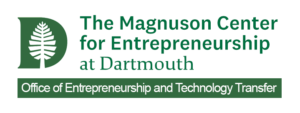Magnuson Interns Help Launch Upper Valley Delivery Co-op
With national apps like Uber and DoorDash eating into the profits of local restaurants, Upper Valley entrepreneurs are taking matters into their own hands.
The proliferation of delivery apps might seem like a boon for local restaurants, particularly as the pandemic made people uncomfortable with in-person dining. But behind the facade there’s a different reality: apps like Uber Eats and DoorDash typically charge restaurants 20-30% commissions, eating into already-narrow profit margins.
That’s just one reason that these apps make Jarett Berke, Tuck '17, Caretaker of Lou's Restaurant & Bakery in Hanover, see red.
“The national third party delivery platforms are destroying independent restaurants. Their fees are three to six times the typical profit margin, they are extracting money from communities like ours and sending it to billionaires in Silicon Valley, they hoard our data and our customer information, and they are already starting to vertically integrate by building their own kitchens and cutting us out,” Berke explained. “The future for independent restaurants like Lou's will be bleak if these companies are allowed to continue operating how they do.”
Around the country, delivery co-ops are popping up to try to provide the take-out service that customers demand, with a business model that is sustainable for restaurants. Berke had an idea for a co-op in the Upper Valley, which would deliver goods from local restaurants and shops directly to consumers, cutting out the national apps. The result, The Upper Valley Eateries and Retail Cooperative (U.V.E.R), launching soon.
“The Upper Valley Eateries and Retail Cooperative (U.V.E.R. Co-op) is a community owned marketplace and delivery service connecting restaurants, farms and retailers directly to Upper Valley consumers,” says Chris Acker, of Hartford, executive director of U.V.E.R. “More than ever before, it's important that the Upper Valley community comes together to help support local businesses, especially after the past year. U.V.E.R. Co-op will help keep our economy strong by protecting our restaurants, farms and retailers from national 3rd party delivery companies that decimate profits and take money out of our community.”
After Berke came up with the idea, Acker and John Pepper, owner of Boloco in Hanover helped him bring it to fruition. At the same time, the Magnuson Center had launched a Stand With Small Business initiative, part of the Social Entrepreneurship Internship Grant program, to support local Upper Valley businesses by providing up to $2,500 in funding to interns who work with local businesses.
“The Magnuson Center is partnering with local businesses that have been impacted by COVID and that are looking for entrepreneurial minded students who want a front-line experience at learning what it takes to run and grow a small business,” said Doreen Cutter, Administrative Coordinator for The Magnuson Center.
Through the program two interns, Michael Zhang, '21 and Mia Leko, ’22, began working with U.V.E.R. in the winter semester, and opted to stay on through the spring to see the project to completion.
“They have done a fantastic job at helping us build out financial models, assist with community outreach, helping brainstorm and problem solve issues along the way,” Acker said.
Zhang said that during a time when experiential learning is hard to come by, the internship has been a huge learning experience.
“Mia and I, as interns, helped with forming the idea into something tangible,” he said.
The chance to give back to the Upper Valley community is a bonus.
“I’ve really grown to love the Upper Valley and care for it. To be part of something that helps the Upper Valley is special to me,” Zhang said. “COVID has impacted local businesses in a negative way and really made businesses struggle, so to work on U.V.E.R. to help local businesses is really just a neat experience.”
Since the co-op business model is unique, setting up the business and finding the technical support to run it has been challenging, Berke said. The interns have been at the forefront of organizing the business.
“Getting the perspective and astuteness of Mia and Michael has been instrumental,” Berke said.
Now that the co-op is nearly ready to launch, Acker hopes that it will change how people order food in the Upper Valley, even beyond the pandemic.
“Our goal is to work together to keep costs as low as possible, provide the best customer experience and return any profits to the members of the cooperative,” he said. “We have all had to put on our thinking caps and become more creative in order to make ends meet over the past year, and U.V.E.R. Co-op is a direct result of that. Yes, it was born during COVID, but this service would have come around eventually even without the pandemic.”
In the long term, preserving the profits of small businesses in the region could help the entrepreneurs of the Upper Valley continue to thrive.
“Anyone who has spent any time in this area knows how very special and unique it is,” Acker said. “If I get an opportunity to help preserve that and make it a better place to live, I'm in.”

